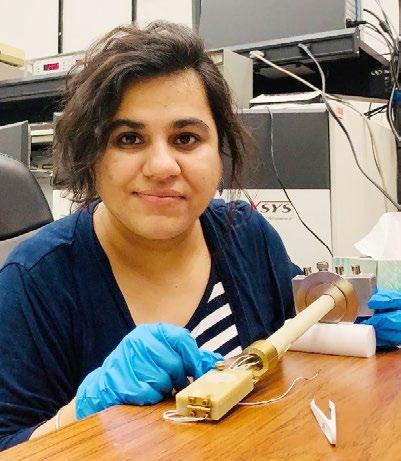
4 minute read
Grad Student: Henna Popli
Henna Popli Physics graduate student Henna Popli was born in the vibrant city of New Delhi, India. She had an inquisitive mind from an early age, and her family always supported her curiosity. This led to her fascination with science and technology. In high school, she wanted to be an astronaut and idolized Kalpna Chawla, an American astronaut, engineer, and the first woman of Indian origin to go into space, though, unfortunately, her endeavor ended with the accident of the Space Shuttle Columbia in 2003.
Popli’s ambition of becoming an astronaut led her to pursue an undergraduate degree in physics from Khalsa College at the University of Delhi, India. Following graduation, she continued to explore her passion for physics by working on a master’s degree from the School of Physical Science at Jawaharlal Nehru University, New Delhi.
“My exposure to physics research came through interactions with professors, researchers, and scientists, as well as attending lectures, workshops, and summer schools,” she said. While writing her master’s thesis, she was exposed to the field of condensed matter physics and decided to get a Ph.D. She was accepted to the U and was thrilled to join an R1 research university. Popli is a member of the Boehme Group, a research group led by Christoph Boehme, professor of Physics & Astronomy and chair of the department.
Research in spintronics
At the U, Popli studies how electron spins move around in condensed matter materials. The research field is called spintronics, short for spin electronics, where the electron spin is used to carry information. Electrons behave as tiny bar magnets as they orbit around the nucleus of an atom. Using quantum mechanics (the science dealing with the behavior of light and matter at scales smaller than atoms) to measure the orientation of the spin, we get two answers—often called spin up or spin down or 1 and 0— and a spintronic device utilizes the intrinsic property of the electrons and its associated magnetic moment. “What this means is that in addition to using the charge properties of particles like electrons, their spin can also be exploited,” said Popli. Traditional electronics make use of the mobility of electrons to process information. Spintronics offers an alternative, relying on the electron’s magnetism, or spin, to encode information. Various external magnetic fields can be applied to control their magnetic states, and Popli studies how this works.
She also studies spin polarization propagation in organic semiconductors, and the group has had success in demonstrating that an organic-based magnet can carry waves of quantum mechanical magnetization, called magnons, and convert these waves into electrical signals. One technique used intensively in her lab is called “electron magnetic resonance spectroscopy,” a spin spectroscopy technique similar to MRI (magnetic resonance imaging), used by physicians to show images inside our bodies. “What I find fascinating about my research is the ability to manipulate and control minuscule particles by means of electricity and magnetism and then observe them through electronic processes,” she said.
The group is hopeful their work in spintronics will lead to more progress in having magnonics surpass electronics, since magnonic systems could be smaller and faster, with less heat loss and less energy required. Spintronics devices have applications ranging between quantum computing and sensor technologies.
During her graduate years, Popli has enjoyed teaching and participating in outreach activities. “It’s been exciting to show high school students and undergraduates really cool science experiments and discuss creative ideas,” she said. Teaching is something she feels strongly about, and she hopes in the future she can introduce new teaching methodologies to physics education to inspire and nurture scientific curiosity in young minds.
Mentors and career plans
She has enjoyed working with Professor Boehme and Dr. Hans Malissa, a research assistant professor of physics and astronomy. “I feel fortunate to be a graduate student in Dr. Boehme’s research group,” she said. “He is extremely smart, excels in his field, and is a very kind person—it’s reflected in the way he mentors students. I am always amazed by his timemanaging capabilities, attention to details, and his optimism. His advice has really helped me advance in my career. Another special mention is Dr. Malissa. I have enjoyed countless discussion sessions with him, and his dedication to science inspires me very much.”
Popli feels fortunate to have been part of some exciting research projects with the Boehme Group and has collaborated with several other research groups, including the Vardeny research group in the Department of Physics & Astronomy and also research groups in Berlin and Regensburg in Germany, which resulted in her being included as one of the coauthors in more than six publications in peer-reviewed journals, including a first-author publication.
Popli has been active in WomPA (Women in Physics and Astronomy), which provides a forum to share her experiences with other women physicists. She also has served as a member of the department’s GSAC (Graduate Student Advisory Committee), where she was involved in reforming opportunities for graduate students, especially international students. Most recently, she represented graduate students on the College of Science Dean Search Committee in 2019. When she isn’t in the lab, she relaxes with music and food, bringing a bit of India to Salt Lake City through her mother’s recipes. She also enjoys hiking and taking long walks.
After she completes her Ph.D. in the summer of 2021, Popli will explore career opportunities in scientific and industrial research.










